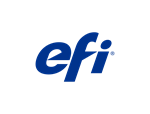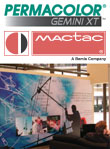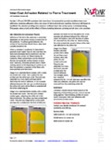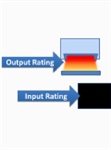
Nazdar SourceOne is pleased to announce it has been selected as one of EFI’s Partners of the Year. This honor was given to SourceOne for being one of ten worldwide partners that sold the most EFI Inkjet Solutions printers in 2014.
Tuesday, February 17, 2015/Author: Anonym/Number of views (4358)/Comments (0)/
Tags:

The Wave of the Future?
Screen exposure has become a very active topic due to the emergence of a new class of exposure systems employing a light source that has become ubiquitous in many facets of our lives—LEDs (light-emitting diodes). Exposure systems powered by UV LEDs began hitting the market in 2013 and have quickly attracted a lot of attention, particularly among garment printers. They offer several tantalizing advantages over conventional light sources and the potential to streamline prepress workflow.
Monday, January 26, 2015/Author: Anonym/Number of views (3786)/Comments (0)/
Tags:

A Highly Engineered Double-Sided Mounting Film
Watch MACtac's Jason Yard and Brittany Franzen introduce the new standard in mounting films.
Thursday, December 11, 2014/Author: Anonym/Number of views (4764)/Comments (0)/
Tags:

What happens when flame treating is used between printing an ink layer over another.
Nazdar's UV and UV-LED container inks have been formulated to provide excellent inter-coat adhesion; meaning adhesion when one layer of ink is printed over another, between ink layers is excellent. For plastics printing, it is common to flame treat the surface prior to initial printing. This paper takes a look at the effect of flame treating between printing an ink layer over another.
Wednesday, November 19, 2014/Author: Anonym/Number of views (0)/Comments (0)/
Tags:

Learn more about UV-LED curing digital and screen inks.
There are many benefits to UV-LED curing verses mercury vapor curing: low heat to the substrate, consistent & long bulb life, low energy consumption, near visible UV output for safer work environment, no ozone emissions, and high UV output to cure LED formulated inks.
Friday, November 14, 2014/Author: Anonym/Number of views (3384)/Comments (0)/
Tags:

Over the past decade, inkjet and other digital technologies have been revolutionizing production processes in many printing segments. One traditional market making a quick and easy transition to digital printing methods is the area of ceramic tile decoration.
Friday, October 24, 2014/Author: Anonym/Number of views (3267)/Comments (0)/
Tags:

It sounds so simple: Ink on paper. It’s a process that’s been around for thousands of years. Yet getting ink to adhere to paper — or any substrate — is actually a somewhat complex chemical and physical process. Paper is easiest material to print on, but even it has adherence challenges, as anyone who has ever has their hands blackened by newsprint can tell you. Those challenges are compounded when non-paper substrates are involved.
Thursday, October 16, 2014/Author: Anonym/Number of views (3115)/Comments (0)/
Tags:

Over the past decade, advancements in inkjet technology have revolutionized the printing process. White inks; UV LED curing; the ability to inkjet on semi-flat products; the development of ever-faster single pass printheads; higher resolutions with grayscale capabilities; increased print-to-product offsets; improved software; and the ability to communicate with SAP-type systems have all made businesses look hard at changing the traditional methods of analog printing they have historically employed for part decoration.
Thursday, October 16, 2014/Author: Anonym/Number of views (2924)/Comments (0)/
Tags: